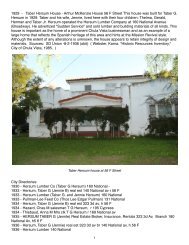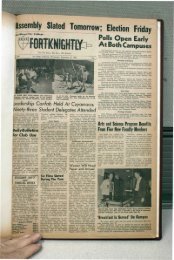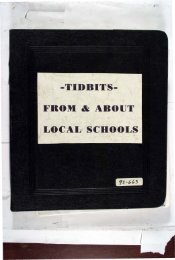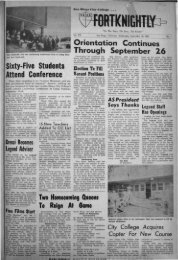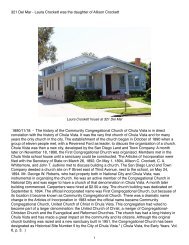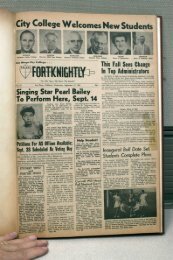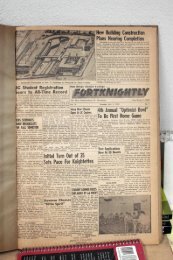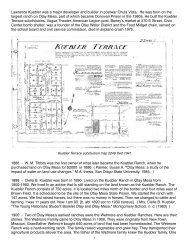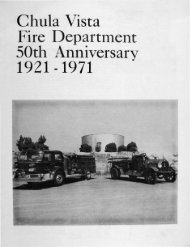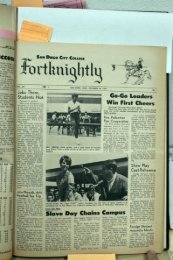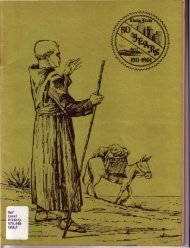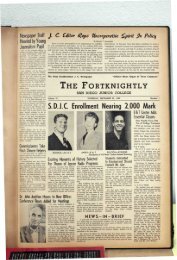doc241 - Schoenherr Home Page in Sunny Chula Vista
doc241 - Schoenherr Home Page in Sunny Chula Vista
doc241 - Schoenherr Home Page in Sunny Chula Vista
Create successful ePaper yourself
Turn your PDF publications into a flip-book with our unique Google optimized e-Paper software.
Dana has also left his op<strong>in</strong>ion on record, which is worth reproduc<strong>in</strong>g: "The language<br />
of these people . . . is the most brutish, without any exception, that I ever heard,<br />
or that could be conceived of. It is a complete slabber. The words fall off at the ends of<br />
their tongues, and a cont<strong>in</strong>ual slabber<strong>in</strong>g; sound is made <strong>in</strong> the cheeks outside the<br />
teeth."<br />
Not only had they no written language of their own, but they were provided with<br />
no facilities for acquir<strong>in</strong>g one from their new masters. The friars were not merely <strong>in</strong>different<br />
to the education of the Indians--they were <strong>in</strong>flexibly opposed to it. Not even their<br />
favorite neophytes were permitted to learn to read, and their servants learned only such<br />
th<strong>in</strong>gs as would aid them <strong>in</strong> provid<strong>in</strong>g for their masters' comfort. At a time when the territorial<br />
governors were utterly unable to provide for the education of the gente de razon, it<br />
was scarcely to be expected that they could do anyth<strong>in</strong>g for the Indians, who were under<br />
the especial care and jurisdiction of the missionaries. To the soldiers, the Indians<br />
were despised foes; to the citizens, they were <strong>in</strong>efficient and troublesome servants.<br />
The employment of Indians as house servants was general, for they were very<br />
cheap. They were held under a strict discipl<strong>in</strong>e and not <strong>in</strong>frequently thrashed, as it was<br />
claimed that <strong>in</strong> many cases they would not work without their regular castigation. While<br />
Wm. H. Davis and Capta<strong>in</strong> Paty were d<strong>in</strong><strong>in</strong>g with Capta<strong>in</strong> Thomas W. Robb<strong>in</strong>s at Santa<br />
Barbara <strong>in</strong> 1842, he<br />
<strong>Page</strong> 180<br />
told them about an Indian cook whom he had had <strong>in</strong> his employ for years, but who had<br />
to be soundly thrashed about twice a year to keep him <strong>in</strong> order the rest of the time. To<br />
prove this to his <strong>in</strong>credulous guests, he called the cook, a man weigh<strong>in</strong>g 200 pounds or<br />
more, who laugh<strong>in</strong>gly confessed the truth of the statement. It is related that Philip<br />
Crosthwaite had a number of Indians work<strong>in</strong>g for him, and sometimes they grew lazy<br />
and refused to work. Then he tied them up one at a time, and gave them a good whipp<strong>in</strong>g,<br />
whereupon they went to work aga<strong>in</strong>. They did not appear to resent such treatment,<br />
but acquiesced <strong>in</strong> its necessity. It seems to have been the custom to beat them<br />
for other causes, without "due process of law," <strong>in</strong> earlier days. In 1843, a San Diego<br />
man was f<strong>in</strong>ed fifty dollars because his wife had severely beaten an Indian servant. The<br />
missionaries did not hesitate to punish them for a variety of trivial offenses. Solitary<br />
conf<strong>in</strong>ement was a favorite form of discipl<strong>in</strong>e, but sometimes the good fathers would<br />
take them across their knees and adm<strong>in</strong>ister the sort of castigation that is supposed to<br />
be the exclusive perquisite of small boys. In a few <strong>in</strong>stances, the mission discipl<strong>in</strong>e was<br />
so severe as to lead to bloody rebellions, but noth<strong>in</strong>g of this k<strong>in</strong>d occurred at San Diego.<br />
The story of the Indian, s<strong>in</strong>ce known to white men, is largely a story of <strong>in</strong>surrections,<br />
crimes and executions. There were men of good character among them, but they<br />
were "as two gra<strong>in</strong>s of wheat hid <strong>in</strong> a bushel of chaff." The story of these early troubles<br />
can only be briefly sketched.<br />
Their first raid on the Mission seems to have been <strong>in</strong>spired by a desire to plunder,<br />
coupled with profound ignorance of the white man's methods of warfare.<br />
The destruction of the first mission, <strong>in</strong> 1775, was followed by an aftermath of<br />
troubles of various k<strong>in</strong>ds. An Indian called Cárlos, who had been a leader <strong>in</strong> the revolt,<br />
professed repentance and took refuge <strong>in</strong> the Presidio church. General Rivera ordered<br />
Father Fuster to deny the fugitive the right of asylum, and upon his refusal, forcibly entered<br />
the church and carried the Indian off. Fuster thereupon excommunicated Rivera



